Glaucoma
Glaucoma And Your Eyes

What Is Glaucoma?
Glaucoma is an eye condition that is caused when too much fluid pressure builds in the eye. Glaucoma seems to be an inherited disease and often shows up later in life. Glaucoma causes an abrupt elevation in your intraocular pressure, which can damage your optic nerve resulting in vision loss and vision problems. If the increased intraocular pressure caused by glaucoma continues, the result will be vision loss. Without treatment, glaucoma can cause total permanent blindness within a few years.
Most people with glaucoma have no early symptoms or pain from the increased intraocular pressure caused by glaucoma. Because of the complexity and seriousness of glaucoma, we highly recommend visiting our offices regularly so that we can diagnose and treat the condition before it becomes a problem. If you are over the age of 45, and have a family history of glaucoma, you should have a complete comprehensive eye examination with our offices every once to two years. If you are a diabetic and have a family history of glaucoma or other eye diseases, your chances of developing glaucoma are greatly increased.
How Does Glaucoma Cause Increased Intraocular Pressure?
Glaucoma usually occurs when there is an increase in your intraocular pressure. The increase in intraocular pressure occurs when the fluid pressure in your eye's anterior chamber rises. In a normal functioning eye the aqueous humor, the fluid inside the eye, flows out of the eye through the drainage angle. The drainage angle is a microscopic drainage system within the eye. When this channel becomes blocked, fluid will build up resulting in glaucoma. It is not exactly known why the drainage angle becomes blocked; however, this condition is most often inherited.
Although increased intraocular pressure will lead to glaucoma, there are other problems that can cause glaucoma. These other causes include a blunt or chemical injury to the eye, severe eye infection, blockage of the blood vessels in the eye, inflammatory conditions of the eye, and occasionally eye surgery to correct another condition. Glaucoma usually affects both eyes, but can affect each eye to a different extent.
What Are The Different Types Of Glaucoma?
Chronic Open-Angle Glaucoma - Chronic open-angle glaucoma is the most common form of glaucoma in the United States. The risk of developing this form of glaucoma increases with age. As we age the drainage angle of the eye becomes less and less efficient. With the drainage angle becoming less efficient, the pressure within the eye will increase gradually, and possibly damage the optic nerve. It is possible for some patient's to experience a sensitivity to normal eye pressure and are at risk for optic nerve damage. Chronic open-angle glaucoma causes damage to vision so gradually and painlessly that you are not aware that your optic nerve has problems until it is already damaged.
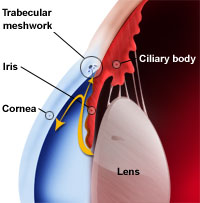
Angle-Closure Glaucoma - Sometimes the drainage angle of the eye may become blocked. The iris of the eye may drop over top of the drainage angle and completely close it off. When this happens, eye pressure builds up suddenly and an acute angle-closure glaucoma attack occurs. Below are some of the more common symptoms of an attack:
• Vision is blurred
• Severe pain in the eye
• Headache
• Rainbow colored halo's around lights
• Nausea or vomiting
Having an acute angle-closure glaucoma attack is a serious eye emergency. If you are experiencing any of these symptoms, please call our offices immediately. If this type of glaucoma is not treated promptly, blindness can occur. It is possible to experience glaucoma with both features of chronic open-angle glaucoma and acute angle-closure glaucoma. This may be referred to as either chronic angle-closure glaucoma or mixed mechanism glaucoma.
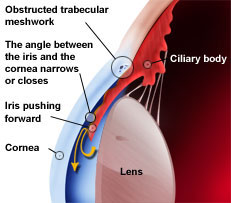
Who Is At Risk For Glaucoma?
Our doctor's take into consideration many different types of information to determine if you are at risk for developing glaucoma. Glaucoma most often occurs in adults after the age of 40, but can also occur in young adults, children and even infants. In patients who are African-American, glaucoma occurs more frequently and at an earlier age, also with a greater chance of vision loss. Our doctor's look at many different factors, but focus largely on the following:
• What is the age of the patient
• Is the patient over the age of 40
• Does the patient have poor vision
• Is there a family history of glaucoma
• Is the patient of African ancestry
• Does the patient have diabetes
• Does the patient have any past eye injuries
Our doctor's look closely at these factors and will be able to determine whether you will need treatment for glaucoma, or if you should be closely monitored as a glaucoma suspect. The term glaucoma suspect refers to a patient whose risk for developing glaucoma is higher than normal. If you are a glaucoma suspect it is important that you have comprehensive eye examinations regularly to detect any early signs of damage to your optic nerve.
What Are The Symptoms Of Glaucoma?
Generally, most people experience few or no symptoms of glaucoma. The most common early sign of glaucoma is the loss of peripheral vision, and can possibly go unnoticed until late in the disease. We suggest a complete comprehensive eye examination with our offices every one to two years to detect any early signs of glaucoma. It is possible for your intraocular pressure to rise suddenly to severe levels. If this sudden rise in your intraocular pressure occurs you will experience sudden eye pain, a headache, blurry vision, and the appearance of rainbow colored halo's around lights. Please contact our offices immediately if you are experiencing any of the following:
• Narrowing of your vision, also known as tunnel vision
• Vision Loss
• Redness in the eye
• Your eye looks hazy
• Nausea or vomiting
• Severe pain inside the eye
• Rainbow colored halo's around lights
If you are experiencing any of these symptoms, please call our offices immediately.
How Is Glaucoma Detected?
The best way to detect the early signs of glaucoma is to have comprehensive eye examinations regularly with our offices. For a glaucoma evaluation our doctor's will perform the following:
• Check your intraocular pressure
• Examine the drainage angle of the eye
• Examine the optic nerve for any damage
• Test the peripheral vision of both eyes
• Nausea or vomiting
Our doctor's may determine during the examination that photograph's of the optic nerve are necessary. It is possible that these tests may need to be repeated on a regular basis to monitor any changes with your condition.
How Is Glaucoma Treated?
The damage caused by glaucoma is irreversible. To help prevent any further damage to your eyes, our doctor's may recommend medications, eye drops, laser surgery, or surgery in the hospital. The most affective way to prevent vision loss is to have comprehensive eye examinations on a regular basis. We suggest examinations regularly because glaucoma can progress without you knowing it, and this can cause many unwanted problems with your vision. We also suggest examinations regularly because it may be necessary to change or make adjustments to your treatment from time to time.
What Medications Are Given For Glaucoma?
Glaucoma is a disease that is usually controlled with eye drops used on a regular basis. These medications help decrease your intraocular pressure, either by improving the flow through the drainage angle or by slowing the amount of aqueous fluid produced within the eye. These medications can help preserve your vision, but some patient may experience some side effects from taking them. Please contact our offices immediately if you are experiencing any side effects from taking any of the medications we have given you. Some eye drops may cause the following side effects:
• A stinging sensation
• Red eyes, or redness of the skin surrounding the eyes
• Any changes in your pulse or heartbeat
• Any changes in your energy level
• Any changes in breathing patterns
• Dry mouth
• Any changes in your sense of taste
• Headaches
• Blurred vision
All prescribed medications can have adverse side effects, and all have the potential to interact with other medications you may be taking. Therefore, it is very important that you make a list of all the medications you are taking on a regular basis and bring it to our office when you have an appointment.
How Does Laser Surgery Treat Glaucoma?
Depending on the type of glaucoma the patient has will determine the best possible laser surgery treatment. For open-angle glaucoma a treatment known as Trabeculoplasty is used to modify the drainage angle to help control eye pressure. For angle-closure glaucoma a method known as Iridotomy is used to create a hole in the iris which improves the flow of aqueous fluid inside the eye to the drainage angle.
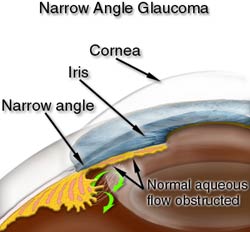
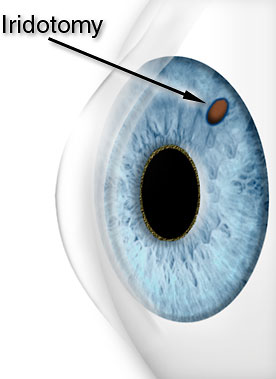
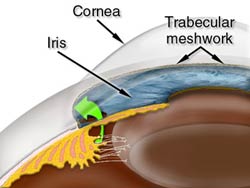
What Other Types Of Surgery Are There?
Sometimes to treat glaucoma surgery in an operating room at the hospital is needed. Our surgeon would use fine, microsurgical instruments to create a new drainage channel for the aqueous fluid to leave the eye. As with laser surgery, this type of surgery is usually done on an outpatient basis. As with all surgical procedures, there are risks. With today's advancements in medicine, serious complications with having glaucoma surgery are very uncommon, but can occur. Having this type of glaucoma surgery is recommended to prevent any further damage to the optic nerve.
Open-angle glaucoma is most commonly treated with a combination of eye drops, laser trabeculoplasty and microsurgery. Usually the patient is prescribed eye medications to treat glaucoma, however, some patients benefit from having laser surgery or microsurgery in the early stage of glaucoma.
Vision loss caused by glaucoma is irreversible and cannot be restored. The best prevention for glaucoma is early detection and proper treatment methods which our doctor's will prescribe for you. If your intraocular pressure is successfully lowered, the chances of further vision loss from glaucoma will be prevented. It is important to keep in mind that most patient's who have glaucoma do not go blind if they follow our doctor's orders precisely.
"Our Reputation Speaks For Itself"

